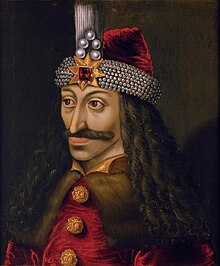Everyone knows Dracula as a blood-sucking vampire, but in real life Vlad Dracula was the Prince of Wallachia, a lawless region bearing the brunt of Ottoman expansion into Eastern Europe. In Vlad: The Last Confession, C.C. Humphreys uses three characters close to Dracula to tell his tale: his mistress, his priest and his closest friend.
And an interesting life it was too. Taken into captivity in Edirne at a young age by the Ottomans to secure his father's loyalty, Vlad grew up amongst the Turks, fostering a life-long hatred. This is also where he first witnessed impaling, his speciality method of punishment in later years. Whilst Vlad's brother converted to Islam and chose to stay in the Ottoman Empire, Vlad himself returned to rule Wallachia sporadically before finally being captured by his Christian allies, the Hungarians. When he was finally killed, his head was reportedly displayed at the entrance to Constantinople to show the strength of the Ottomans.
I was familiar with lots of this information before reading, being a big fan of Elizabeth Kostova's The Historian, but I do feel that Humphreys did a great job at making the novel both engagingly written and factually accurate. Humphreys also succeeded in placing Vlad in context, and judging him against the period he was living in, rather than against modern standards. Yes, Vlad killed tens of thousands of people, and lots of them were impaled, but he inherited a lawless place that was in many ways the buffer region between Christian Europe and the Muslim Ottoman Empire. He had to show massive strength to get his boyars (lords) to obey him. Vlad's brutal methods did work to a certain degree as reports of impalment and turbans nailed to heads apparently put the Ottoman leader, Mehmet, off attacking Wallachia directly.
The sections of the book dealing with impaling were quite graphic and not for readers with weak stomachs; I was glad to not be eating whilst reading them! Aside from that, the only criticism I can make of this book is the device of some of the characters posthumously 'judging' Vlad. This meant that the narrative was disrupted every now and again with asides from characters I didn't really care about, jarring the flow of the book. Personally, I think it would have been better told as a straight fictional biography rather than with the 'confession' device.
This one comes highly recommended from me, especially for fans of The Historian or epic adventure/war novels.
Verdict: Thoroughly researched and engaging novel about the life of the real Dracula.
Source: Library
Score: 4.5 out of 5



This comment has been removed by a blog administrator.
ReplyDeleteThis comment has been removed by a blog administrator.
ReplyDeleteThis comment has been removed by the author.
ReplyDeleteThis comment has been removed by a blog administrator.
ReplyDeleteThis comment has been removed by the author.
ReplyDeleteThis comment has been removed by a blog administrator.
ReplyDeleteThis comment has been removed by the author.
ReplyDelete